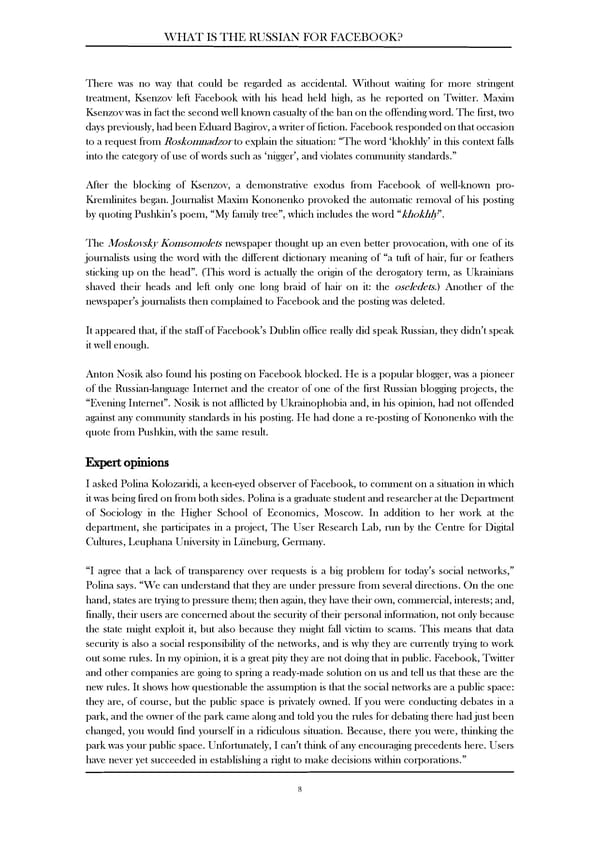WHAT IS THE RUSSIAN FOR FACEBOOK? There was no way that could be regarded as accidental. Without waiting for more stringent treatment, Ksenzov left Facebook with his head held high, as he reported on Twitter. Maxim Ksenzov was in fact the second well known casualty of the ban on the offending word. The first, two days previously, had been Eduard Bagirov, a writer of fiction. Facebook responded on that occasion to a request from Roskomnadzor to explain the situation: “The word ‘khokhly’ in this context falls into the category of use of words such as ‘nigger’, and violates community standards.” After the blocking of Ksenzov, a demonstrative exodus from Facebook of well-known pro- Kremlinites began. Journalist Maxim Kononenko provoked the automatic removal of his posting by quoting Pushkin’s poem, “My family tree”, which includes the word “khokhly”. The Moskovsky Komsomolets newspaper thought up an even better provocation, with one of its journalists using the word with the different dictionary meaning of “a tuft of hair, fur or feathers sticking up on the head”. (This word is actually the origin of the derogatory term, as Ukrainians shaved their heads and left only one long braid of hair on it: the oseledets.) Another of the newspaper’s journalists then complained to Facebook and the posting was deleted. It appeared that, if the staff of Facebook’s Dublin office really did speak Russian, they didn’t speak it well enough. Anton Nosik also found his posting on Facebook blocked. He is a popular blogger, was a pioneer of the Russian-language Internet and the creator of one of the first Russian blogging projects, the “Evening Internet”. Nosik is not afflicted by Ukrainophobia and, in his opinion, had not offended against any community standards in his posting. He had done a re-posting of Kononenko with the quote from Pushkin, with the same result. Expert opinions I asked Polina Kolozaridi, a keen-eyed observer of Facebook, to comment on a situation in which it was being fired on from both sides. Polina is a graduate student and researcher at the Department of Sociology in the Higher School of Economics, Moscow. In addition to her work at the department, she participates in a project, The User Research Lab, run by the Centre for Digital Cultures, Leuphana University in Lüneburg, Germany. “I agree that a lack of transparency over requests is a big problem for today’s social networks,” Polina says. “We can understand that they are under pressure from several directions. On the one hand, states are trying to pressure them; then again, they have their own, commercial, interests; and, finally, their users are concerned about the security of their personal information, not only because the state might exploit it, but also because they might fall victim to scams. This means that data security is also a social responsibility of the networks, and is why they are currently trying to work out some rules. In my opinion, it is a great pity they are not doing that in public. Facebook, Twitter and other companies are going to spring a ready-made solution on us and tell us that these are the new rules. It shows how questionable the assumption is that the social networks are a public space: they are, of course, but the public space is privately owned. If you were conducting debates in a park, and the owner of the park came along and told you the rules for debating there had just been changed, you would find yourself in a ridiculous situation. Because, there you were, thinking the park was your public space. Unfortunately, I can’t think of any encouraging precedents here. Users have never yet succeeded in establishing a right to make decisions within corporations.” 8
 What is the Russian for Facebook? Page 8 Page 10
What is the Russian for Facebook? Page 8 Page 10